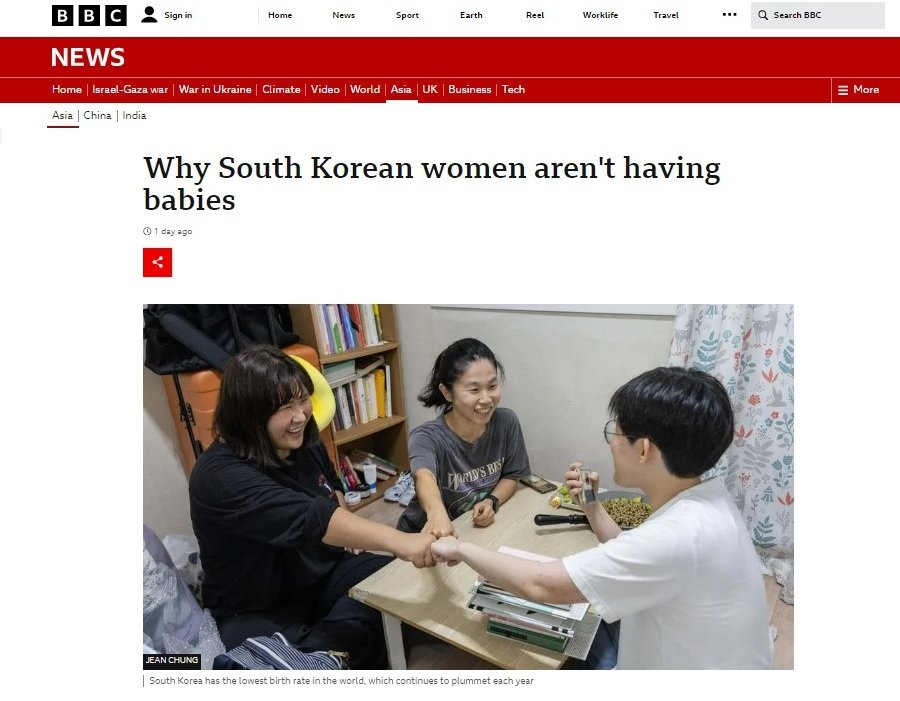“We spent 280 trillion won over 15 years, but we could not escape the low birth rate swamp” (Japan’s Yomiuri Shimbun)
“Policy makers are not listening to youth and women” (BBC)
In the fourth quarter of last year (October to December), when Korea’s total fertility rate (the average number of children expected to be born per woman in her lifetime) fell to 0.65, the lowest level in the world, major media outlets in developed countries reported the news extensively. Low birth rates in developed countries are a global phenomenon, but Korea is falling to the bottom at a rate incomparably faster than other countries.
They focused on various problems facing Korean society, such as excessive private education expenses, inability to reconcile work and childcare, and men’s lack of childcare responsibilities, and expressed concern about the rapid decline in the birth rate.
On the 29th, Japan’s Asahi Shimbun began publishing ‘A-Story’, an 8-episode in-depth reporting series under the theme ‘The reality of Korea’s ultra-low birth rate society’. The article featured a 39-year-old Korean woman who moved to Japan after working for a large company in Korea for a long time.
She said, “Even though my husband and I earned 150 million won a year, we had a huge burden of childcare costs. When young people see these seniors, they think, ‘I don’t want to end up like that.’” She shared the reality in Korea. He pointed out the ‘no kids zone’ cafe where children cannot enter, and the situation of having to go to academies late at night from a young age, saying, “I think Korea has become a society where you don’t want to raise children, and even if you want to have children, you can’t have them.” “He said.
On the same day, the Yomiuri Shimbun pointed out, “Korea has spent a budget of 280 trillion won over 15 years, but it is ineffective and has not escaped the swamp of low birth rate.” He mentioned that there are 157 elementary schools in Korea, which have no new students this year, or 2.5% of the total, and pointed out that if this continues, not only will the pension system be ruined and labor shortages, but even the basic health and safety of the people will be threatened due to a lack of hospitals. .
Public broadcaster NHK also reported that young people are not getting married due to the recent rise in real estate prices, increasing the burden of purchasing a home and renting a house, and job instability.

On the 28th of last month (local time), the British BBC published an article analyzing the background, saying, “The birth rate is decreasing globally, but not as drastically as in Korea.” In response to criticism that Korean policymakers do not listen to the actual voices of young people and women about low birth rates, they introduced that they had personally interviewed several Korean women.
Those who participated in the interview cited the fact that housework and childcare are focused on women, as well as the extremely high cost of housing and private education, as factors causing them to avoid childbirth. In particular, they mentioned the excessive burden of private education, as children receive expensive classes in math, English, and music from the age of four. Stella, a 39-year-old English instructor, said, “I saw them spending up to 700 pounds (about 1.2 million won) per child per month,” adding that many parents believe that their children will fall behind if they do not spend this amount of money.
Yejin, a 30-year-old TV producer, said, “It is difficult to find a man who will equally share housework and childcare.” The BBC also said, “Over the past 50 years, the Korean economy has developed at an incredible pace, promoting higher education and employment for women and expanding their ambitions, but the roles of wives and mothers have not developed at nearly the same rate. This is the crux of the problem.” It was diagnosed. As women’s social participation has increased, women’s childcare and housework should be shared with men, but this is not the case in Korea.
The British Guardian said, “Despite billions of dollars in government policies, Korea’s population crisis has worsened,” noting the low birth rate in East Asian countries along with Japan recording the lowest number of marriages since its defeat in World War II. The Guardian said, “Policies to encourage childbirth are failing due to soaring childcare costs, real estate prices, lack of quality jobs, and extreme education system.”
Tokyo =
Paris =
Source: Donga
Mark Jones is a world traveler and journalist for News Rebeat. With a curious mind and a love of adventure, Mark brings a unique perspective to the latest global events and provides in-depth and thought-provoking coverage of the world at large.